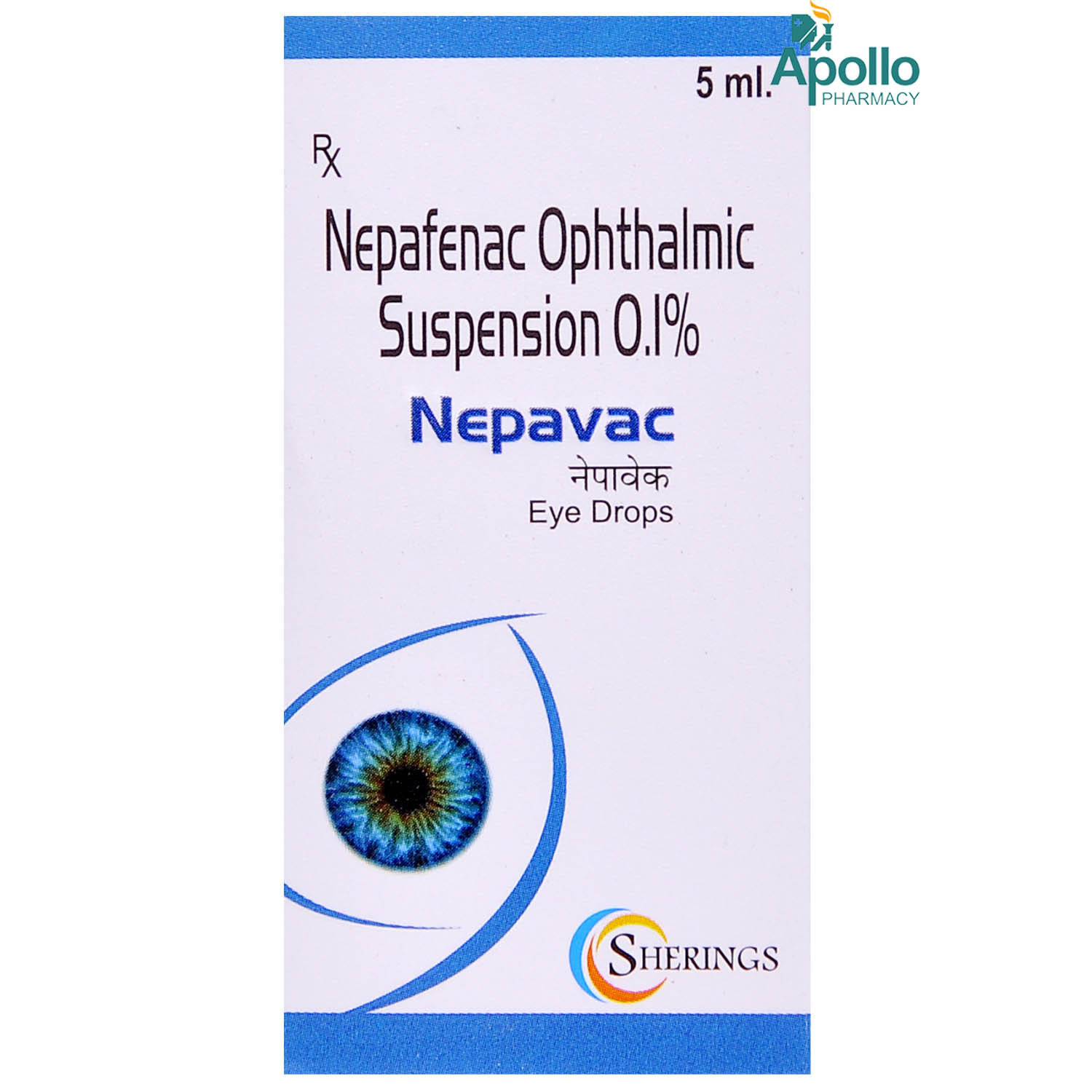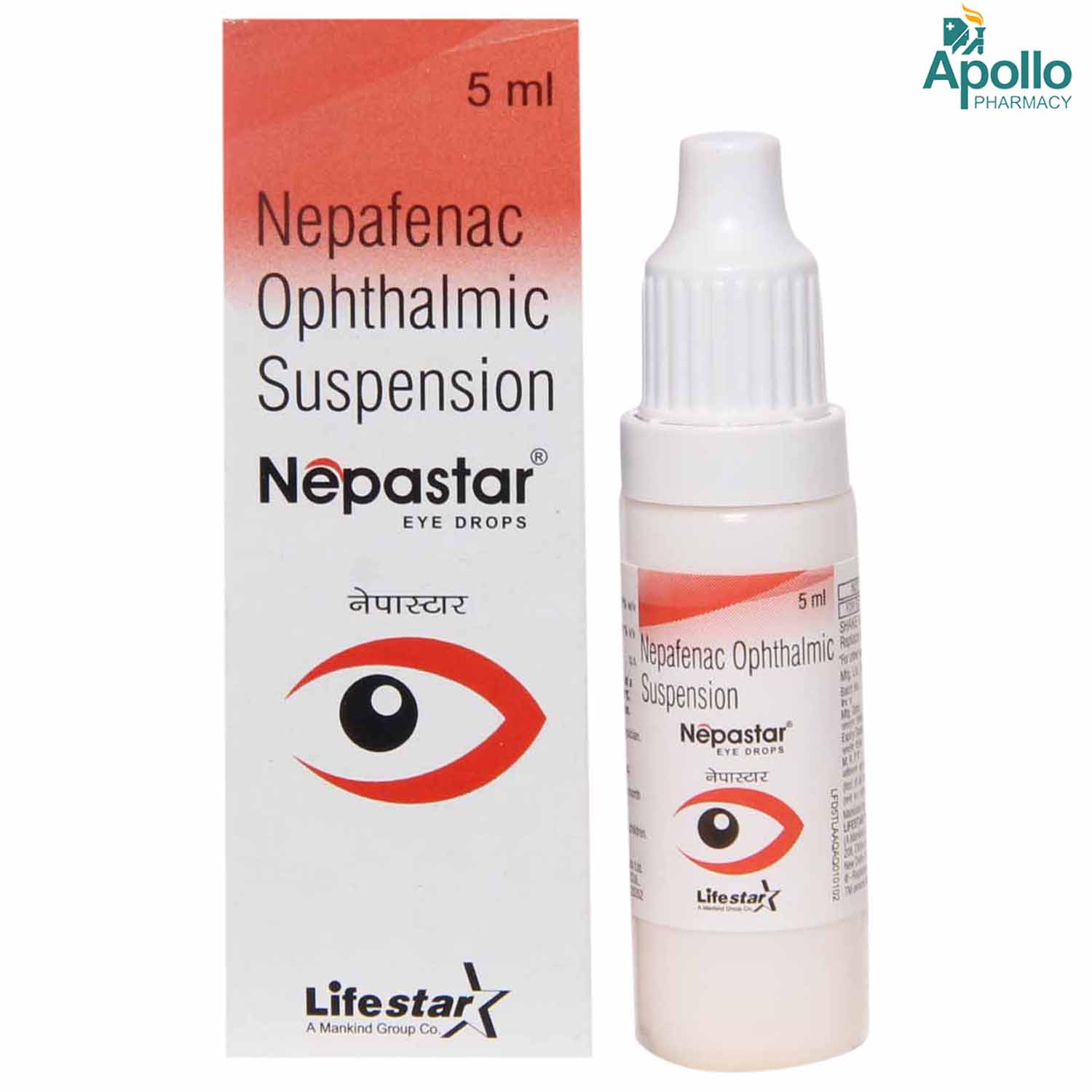Retinep 0.1%W/V Eye Drops 5ml
MRP ₹181
(Inclusive of all Taxes)
₹27.1 Cashback (15%)
Provide Delivery Location

secured payment

india's most trusted pharmacy

genuine products
Composition :
Manufacturer/Marketer :
Consume Type :
Expires on or after :
Return Policy :
About Retinep 0.1%W/V Eye Drops 5ml
Retinep 0.1%W/V Eye Drops 5ml belongs to a group of medicines known as nonsteroidal anti-inflammatory drugs (NSAIDs), mainly suggested to relieve eye irritation, pain, and redness after a cataract eye surgery. This medicine is also indicated to reduce the risk of macular oedema, swelling in the back of the eye after cataract surgery in patients dealing with diabetes. Patients often experience redness, itchiness, inflammation, in their eyes for a week, and these symptoms will disappear after a few weeks. Macular oedema is an eye condition that can even cause permanent loss of vision and occurs when blood vessels present in the retina's light-sensitive part, the eye gets leaked.
Retinep 0.1%W/V Eye Drops 5ml consists of Nepafenac, which blocks the action of prostaglandin H synthase (cyclooxygenase), which is an enzyme required for prostaglandin. These prostaglandins are responsible for causing pain, redness, inflammation in the eyes, so blocking prostaglandins it provides relief in painful eye conditions.
Use Retinep 0.1%W/V Eye Drops 5ml as prescribed. Your doctor will advise you on how many drops to instill based on your medical condition. Like all medications, Retinep 0.1%W/V Eye Drops 5ml may cause some undesirable effects; however, not everybody gets them. The most common side effects of using Retinep 0.1%W/V Eye Drops 5ml include blurred vision, vision change, reduced vision. These unpleasant side effects do not require medical attention and may go during the treatment as the body adjusts to the new medication.
Retinep 0.1%W/V Eye Drops 5ml can not be used by the person who is allergic to it or has diabetes, arthritis, or a bleeding or blood-clotting disorder such as haemophilia and dry eye syndrome. Retinep 0.1%W/V Eye Drops 5ml should not be used for more than 14 days after cataract surgery unless suggested by the doctor. You are recommended to remove the contact lenses before using Retinep 0.1%W/V Eye Drops 5ml and reinsert them after 15 minutes as it may change the colour of the lenses. You should avoid touching the eye dropper or placing it directly in the eye. Touching the dropper may contaminate the tip and infect the eye, leading to a serious eye problem.
Uses of Retinep 0.1%W/V Eye Drops 5ml

Have a query?
Directions for Use
Key Benefits
Retinep 0.1%W/V Eye Drops 5ml comes into the category of nonsteroidal anti-inflammatory drugs (NSAIDs) to prevent and relieve the pain and inflammation after eye surgery (cataract). It is also used to reduce the risk of macular oedema after cataract eye surgery. Retinep 0.1%W/V Eye Drops 5ml consists of Nepafenac. Retinep 0.1%W/V Eye Drops 5ml block the action of prostaglandin H synthase (cyclooxygenase), which is an enzyme required for prostaglandin. These prostaglandins are responsible for causing pain, redness, inflammation in the eyes, so blocking prostaglandins provides relief in these conditions.
Storage
- Eating foods high in vitamins C (like oranges, peppers, and tomatoes) and E (like peanuts, spinach, and broccoli) may help protect your eyes from cataracts or slow them down.
- Quit smoking and cut back on alcohol.
- Wear sunglasses when you are outside to protect your eyes from the sun.
- Keep your blood sugar under control, because high blood sugar can cause changes in the eye lens that lead to cataracts.
- Have regular eye checkups to catch any problems early.
- Gently flush the eye with clean, lukewarm water to remove any debris.
- Use lubricating eye drops (artificial tears) to soothe irritation and re-lubricate the eye.
- Apply a warm compress to the closed eyelid to loosen any foreign particles.
- Practice good eyelid hygiene by gently massaging with a clean washcloth.
- Avoid rubbing your eye to prevent worsening irritation and potential corneal scratches.
- Do not attempt to remove a foreign object with sharp instruments to avoid further damage.
- Seek medical attention immediately if you experience severe or persistent symptoms, significant pain, redness, or vision changes.
- Take healthy and balanced diet.
- Exercise regularly and maintain the healthy lifestyle.
- Reduce the intake of caffeine.
- Use a pillow and elevate your head while sleeping.
- Place cool compresses over your eyes, it may ease discomfort and inflammation.
- Avoid taking high-sugar foods and beverages, they can contribute to inflammation throughout the body, including the eyes.
- Avoid the intake of alcohol, dairy products and processed and fried foods.
- Take diet containing vitamin A-rich foods like carrots, sweet potatoes, spinach, kale, and apricots in your diet.
- Avoid touching your eyes with hands frequently without washing.
- Maintain eye hygiene by washing any discharge from around your eyes several times a day using a clean, wet washcloth or fresh cotton ball.
- Eat a balanced diet rich in omega-3 fatty acids, vitamins A and C, and antioxidants to support eye health.
- Include foods high in antioxidants, such as leafy greens, berries, and nuts.
- Wear protective eyewear during activities that may pose a risk to your eyes.
- Refrain from touching or rubbing your eyes to minimize potential irritation and prevent exacerbating the condition.
- Maintain good hygiene and clean your contact lenses properly (if applicable).
- Get regular eye exams to monitor the condition and adjust treatment as needed.
- Manage underlying conditions, such as glaucoma or diabetes, to reduce the risk of corneal edema.
- Eat vitamin A-rich foods like fish liver, chicken, eggs, carrots, lemons, and mangoes in your diet.
- Eat green leafy vegetables, meat, and dairy products, and increase the consumption of omega-3 fatty acids found in salmon and walnuts.
- Examine your eyes regularly to detect any underlying issues.
- Stay hydrated by drinking plenty of water.
- Eat a well-balanced diet that includes more vegetables, fruits, fish, whole grains, nuts, legumes, and olive oil, and less dairy, meat, and saturated fats.
- Follow a healthy lifestyle by drinking plenty of water and taking sufficient rest.
- Eat balanced diet rich in whole grains, fruits, and vegetables, while minimizing fatty, spicy, and seasoned foods.
- Additionally, avoid seafood to reduce the risk of allergic reactions or infections that may exacerbate symptoms.
Drug Warnings
A person is not allowed to use Retinep 0.1%W/V Eye Drops 5ml if they are allergic to it as it may cause unwanted reactions in their eyes. Before using this medicine, tell your doctor if have dry eye syndrome, arthritis, diabetes, or a bleeding or blood-clotting disorder such as hemophilia. The use of Retinep 0.1%W/V Eye Drops 5ml is restricted not for longer than 14 days after the surgical procedure unless recommended by the doctor. This is an FDA pregnancy category C drug that is not known whether harm an unborn baby so it is best to consult with a doctor if you are pregnant or plan to become pregnant.
Drug-Drug Interactions
Drug-Drug Interactions
Login/Sign Up
Using Retinep 0.1%W/V Eye Drops 5ml and Abciximab can interfere with clotting and cause bleeding, especially when used regularly or for prolonged periods.
How to manage the interaction:
Although taking Retinep 0.1%W/V Eye Drops 5ml and Abciximab together can cause an interaction, it can be taken if a doctor has suggested it. However, if you experience unusual bleeding or bruising, dizziness, lightheadedness, red or black, tarry stools, coughing up or vomiting fresh or dried blood, severe headache, and weakness call a doctor right away. Do not discontinue any medications without consulting a doctor.
Drug-Food Interactions
Drug-Food Interactions
Login/Sign Up
Diet & Lifestyle Advise
- Include food that is rich in vitamin C like citrus (oranges, grapefruit, limes, etc.), tomatoes, kiwifruit, broccoli, etc as it may improve eye health.
- Smoking is bad for health especially for the lungs and eyes so one should quit smoking as it creates chemicals that harm the cells of the eyes.
- Immediately after the cataract surgery, you are provided a pair of sunglasses to wear that helps to minimize any glare and keep eyes protected from bright lights, so wear them properly and stay away from fluorescent lights.
Habit Forming
Therapeutic Class
All Substitutes & Brand Comparisons
RX
NEPAVAC EYE DROPS 5ML
Sherring Life Sciences
₹186.5
(₹33.58/ 1ml)
3% COSTLIERRX
NEPASTAR EYE DROPS 5ML
Mankind Pharma Pvt Ltd
₹205.5
(₹37.0/ 1ml)
13% COSTLIERRX
NEYPAC EYE DROPS
Intas Pharmaceuticals Ltd
₹225.5
(₹40.6/ 1ml)
24% COSTLIER
Alcohol
Safe if prescribed
One should avoid consuming alcohol as it is unknown this drug interacts with alcohol or not.
Pregnancy
Consult your doctor
During pregnancy, Retinep 0.1%W/V Eye Drops 5ml can only be used when prescribed during the first 6 months by the doctor. This medicine can not be used during the last 3 months of pregnancy as it may harm to a fetus.
Breast Feeding
Consult your doctor
Retinep 0.1%W/V Eye Drops 5ml can only be used in breastfeeding women if suggested by the doctor as it is unknown whether this drug passes into breast milk.
Driving
Safe if prescribed
Retinep 0.1%W/V Eye Drops 5ml may cause blurred vision, so one should avoid driving after using this medicine.
Liver
Consult your doctor
Retinep 0.1%W/V Eye Drops 5ml is safe to use if prescribed by the doctor.
Kidney
Consult your doctor
Retinep 0.1%W/V Eye Drops 5ml is safe to use if prescribed by the doctor.
Children
Safe if prescribed
Retinep 0.1%W/V Eye Drops 5ml is not approved to use in children younger than 10 years old.
FAQs
Yes, a contaminated dropper can cause serious infections in the eye that may even lead to lead to serious vision problems. A person should avoid touching the tip of the Retinep 0.1%W/V Eye Drops 5ml dropper or if touched then they need to use a new dropper.
To make sure if this medicine is safe for you, do not use this medicine if you have diabetes, dry eye syndrome, an allergy to any other eye drops, arthritis, a bleeding or blood-clotting disorder, such as hemophilia.
No, you can not use Retinep 0.1%W/V Eye Drops 5ml while wearing the contact lenses as firstly you need to remove them and then can drop the medicine in the eye. This medicine contains a preservative that can discolor soft contact lenses so one should wait for at least 15 minutes after applying for medicine before putting back their contact lenses.
You should not use this medicine for longer than 14 days after having cataract surgery unless suggested by the doctor.
Yes, one can keep using this medicine for the treatment of glaucoma while a person should use only the eye medications that their doctor has prescribed.
Country of origin
Manufacturer/Marketer address







